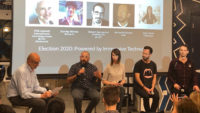By Phil Lelyveld
July 25, 2019
The impact of social media and the Internet on today’s political arena is undeniable, but how will the emerging world of deep fakes, virtual influencers and augmented technologies tip the scales in 2020? During an AWE Nite LA meetup this week at the Phase Two co-working space in Los Angeles, the ETC’s Phil Lelyveld moderated a panel on the impact of emerging technologies on the 2020 presidential election. Panelists included machine learning expert Stanley Bishop, journalism professor Robert Hernandez, filmmaker and Artie founder Armando Kirwin, and bot creator Sally Slade.
Armando Kirwin, founder of AI character dev house Artie, discussed how a deep fake campaign spokesperson —a candidate advocate John Doe —is entirely possible. The bounded problem set of campaign issues is well suited for the current state of virtual being technology. If it didn’t have to respond in real time, it could be an effective campaign tool.

Stanley Bishop of Spacepost Laboratories and Bishop AI said that using artificial intelligence to detect deep fakes is a “cat and mouse” game. GANs (Generative Adversarial Networks) can be used to detect deep fakes, but GANs are also being used to correct the errors in deep fakes that make them detectable.
Magnopus lead AR/VR developer Sally Slade has created an Instagram bot called Billbot to raise awareness when bills come up for discussion within the California legislature. Billbot could be applied to the Federal legislature’s activities.
USC journalism professor Robert Hernandez discussed the difficulty in defining and achieving an “informed citizenry,” and even what constitutes facts versus opinion. Reporting facts selectively is opinion masquerading as factual coverage. He argued that the very concept of objective reporting is unachievable because everyone has biases. Hernandez recommends diversity in the newsroom staff and in the news feeds as a means of undercutting bias.
The panel discussed how rare it is to have a common experience across political and social divides. Natural disasters and major sports events came to mind. Political debates have the potential of drawing an audience from a cross-section of society, but only if the participants collectively represent a cross-section of ideas so a wide swath of people tune in to hear their own opinions voiced.
Virtual influencers could be used to engage young voters in the political process. Slade pointed out that virtual influencer Lil Miquela has already been an advocate for social causes.